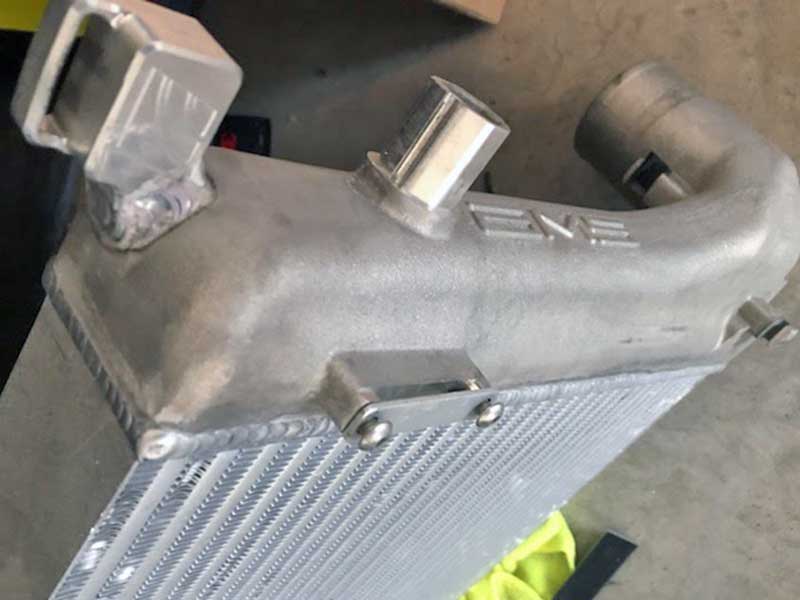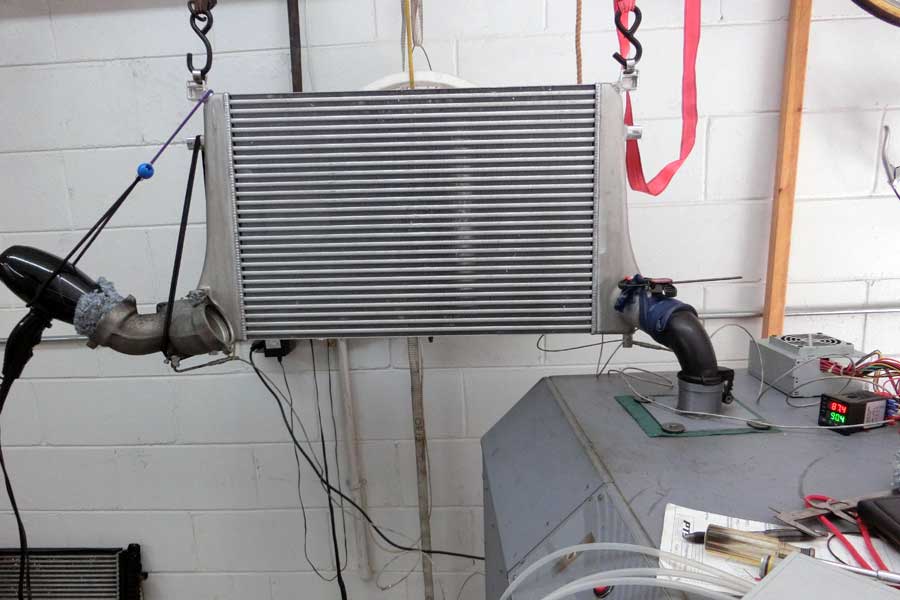Continuing on from the flow bench testing of the AMS Performance IC the intercooler is now being checked for cooling performance.

This test is the same as has been performed with the stock GTI intercooler and Unitronic IC.
The AMS IC is attached to the testing apparatus and temperature measurements are recorded for the duration of the test. This test is repeated twice to collect a total of three datasets with a cool down between each test of an hour or longer to allow the intercooler to return to the garage temperature.

Results:
The AMS intercooler and stock GTI intercooler results are shown on the next chart.

The AMS Performance intercooler has almost no change in output temperature over the first 60 seconds, far outperforming the stock GTI intercooler.
After the first minute the AMS IC slowly begins to heat the output air and this heating continues for the duration of the test.
AMS Performance Intercooler Ranking
Outperforming the stock GTI intercooler was expected, of more interest is how the AMS IC compares with the Unitronic IC, my current installed intercooler.
The chart shows the bench temperature test results for the stock, AMS, and Unitronic intercoolers.

Between the AMS and Unitronic ICs the results are mixed. Over the initial 20 seconds the two perform about equal. For roughly the next 80 seconds the AMS IC is cooling slightly better, until around 100 seconds when the Unitronic outputs cooler air and continues doing so for the remainder of the test.
To generate a composite flow and cooling performance chart the temperature rise at 120 seconds, when the cooling fan is turned on, is used. The three intercoolers then compare as shown in the next chart.

Overall for the criteria I have choosen the Unitronic intercooler has performed the best on the bench tests.
Elaborating on the two points of emphasis from that last sentence.
The criteria for comparison is airflow at 28″ of H2O and degrees of temperature increase in output air after two minutes with high temperature internal airflow and no external cooling airflow. Other criteria could have been selected and while probably would not alter the results of the airflow comparison, the cooling comparison would be different depending on the criteria chosen. For instance, had 60 seconds been selected as the time to record temperature rise then the AMS IC would have ranked higher in cooling performance than the Unitronic intercooler.
Another consideration is that the tests are not being made under the same conditions that the vehicle operates. Use of these results to draw conclusions about on vehicle performance depends on the confidence each person considering the data gives to the test methods. With three product data points there isn’t sufficient information to determine how well the bench test correlates with on vehicle cooling performance. Even with more bench data there are multiple conditions that an intercooler can be tested on the vehicle and the bench test will likely not correlate with all of them.
Based on the criteria I have chosen the AMS intercooler loses out to the Unitronic primarily due to having pressure drop equivalent to the stock GTI intercooler.
The continued heating from the AMS intercooler after the cooling fan is turned on is another mark against the AMS IC. While not a pre-identified criteria it was interesting to observe the heating caused by the AMS IC after the cooling fan was running and the heat sources were removed, shown on the chart below by the data to the right of the pink vertical line.
For 60 seconds after removing the hot air source the temperature output from the AMS intecooler continues to grow hotter while the cooling fan is continuing to run. By the time data recording is stopped the Unitronic output air temperature over ambient is half that of the AMS IC.

My conclusions from the trends shown during the bench cooling test are that comparatively the AMS IC is a more efficient heat sink than the Unitronic IC, a potential source of the lower internal airflow rate, but less effective at ridding that heat from the core to the cooling airflow. These results, along with other information, will be used in my search for the top performing IC for the GTI.
The Unitronic will remain on my GTI for now.

Jeff, thanks for this. I asked you a question about this a couple months back and it put an issue to rest for me. My tuner said my Unitronic intercooler was the issue with my IAT’s being high and I needed to purchase an AMS intercooler. While I do have a hybrid turbo setup, which are known to produce more heat, I think I will be running my Snows water/meth system (without tuning for methanol) for the IAT cooling benefits. I appreciate your post keep up the good work!
You’re welcome! I think the main takeaway is that both AMS and Unitronic are solid improvements.
The results are perplexing to me, given the construction of the AMS IC (tube/fin), especially vs the UNI IC(bar/plate), it should release heat faster than the UNI IC. In-fact it should be similar (in pattern) to the stock IC heat release once fan is turned on.
To be clear I’m not necessarily surprised that UNI has better temps in the end (it is bar/plate after all), just the AMS heat release should, based on its construction, been much faster, and not retain heat the way it appeared to.
Surprising result.
My guess is that it is a product of the fins per inch and the cooling airflow. The fan generates a low airflow and the fins on the AMS IC are very tightly spaced
Hi Jeff, super excited to see more and more ICs added to the bench test! What’s your opinion on FMIC vs “actual” IC?
I’ve only had a little opportunity to compare the two. Performance differences haven’t looked dramatically different to me, but I would want to spend more time comparing the two to have a stronger opinion.